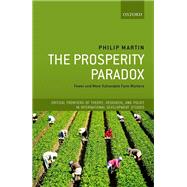Why do farm workers become more vulnerable as countries get richer? As countries get richer, the share of workers employed in agriculture falls. In richer countries, hired farm workers do ever more of the work on the fewer and larger farms that produce most farm commodities.
These hired workers are among the most vulnerable. They include local workers who lack the skills and contacts needed to get nonfarm jobs that usually offer higher wages and more opportunities as well as legal and unauthorized migrants from poorer countries who may not know or exercise their labor-related rights. Government enforcement of labor laws depends on complaints, and vulnerable workers rarely complain.
The Prosperity Paradox explains why farm worker problems often worsen as the agricultural sector shrinks, and lays out options to help vulnerable workers. Analysis of farm labor markets in the US, Mexico, and other countries shows that unions and fair trade efforts to protect farm workers cover a very small share of all workers and are unlikely to expand quickly.
Most labor-intensive fruits and vegetables are eaten fresh. Unsafe food that sickened consumers led to voluntary industry and later government-mandated food safety programs to ensure that food is safe when it leaves the farm, with protocols enforced by both government inspectors and buyers who refused to buy from non-compliant farms. This food safety model offers the most promise to launch a new era in protective labor policies.








